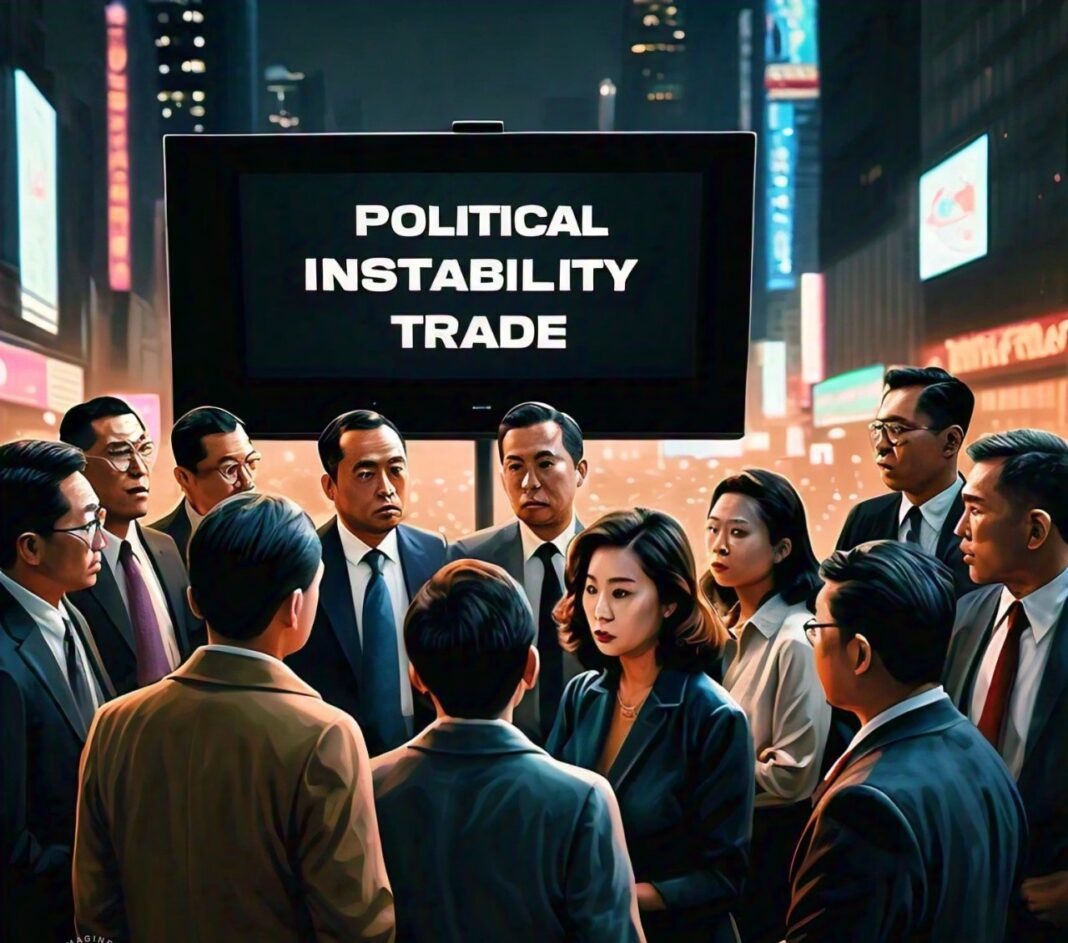Political instability refers to a state of unrest or disorder within a country that can arise from various factors, including political upheaval, social unrest, armed conflict, or regime changes. Political instability trade can have profound effects on global trade, disrupting established patterns and creating uncertainty for businesses and governments alike. From altering trade routes to reducing trade volumes and complicating trade agreements, instability can significantly impact the flow of goods and services across borders.
Such instability can significantly disrupt a country’s governance and economic environment. Examples of political instability include the Arab Spring, the ongoing crisis in Venezuela, and recent turmoil in Myanmar.
Understanding the impact of political instability on international trade is crucial as it influences not only the affected countries but also the global economy. Trade patterns are intricately linked to political stability, and disruptions can lead to broader economic repercussions.
This article aims to investigate the specific ways in which political instability affects international trade patterns. The focus will be on analyzing three primary aspects:
- Trade Volume: How fluctuations in political stability influence the quantity of goods and services traded between nations.
- Trade Routes: The effect of instability on trade routes, including disruptions in logistics and transportation networks.
- Trade Agreements: The impact of political instability on the formation, execution, and modification of trade agreements between countries.
By examining these dimensions, we aim to provide a comprehensive analysis that will offer valuable insights for economists, policymakers, and business leaders. The goal is to enhance the understanding of how political instability can alter trade dynamics and to suggest strategies for mitigating its adverse effects.
Political Instability and Trade Volume
Theoretical Framework
Political instability often creates an environment of uncertainty that can significantly affect trade volume. Economic theories suggest that instability leads to increased risk and unpredictability, which can deter trade and investment. The uncertainty principle posits that businesses are less likely to engage in trade when they cannot predict future market conditions or political stability. Additionally, the investment risk theory highlights how instability raises the perceived risk of investing in a country, potentially leading to decreased trade volume.
Instability can affect market confidence, leading to reduced foreign direct investment (FDI) and trade flows. Businesses may hesitate to enter or expand in markets characterized by political unrest, which impacts overall trade volume.
Sectoral Impacts
The impact of political instability on trade volume can vary across different sectors:
- Commodities: Commodity exports often experience greater volatility. For example, oil-producing countries facing instability may see fluctuating trade volumes due to disruptions in production and export.
- Manufacturing: Manufacturing sectors can be affected by instability through interruptions in supply chains and reduced demand for manufactured goods.
- Services: The service sector may experience changes in trade volume due to fluctuations in tourism, financial services, and other service-related trades.
Different sectors have varying degrees of resilience and adaptability to political instability, influencing how trade volume is impacted.

Political Instability and Trade Routes
Disruption of Trade Routes
Political instability can severely disrupt trade routes, which are essential for the efficient movement of goods across borders. Instability often leads to logistical challenges and security concerns, affecting transportation networks.
- Conflict Zones: Areas experiencing armed conflict or political unrest may see their trade routes blocked or unsafe. For instance, the conflict in Syria has led to significant disruptions in trade routes, affecting not only regional trade but also global supply chains.
- Infrastructure Damage: Political instability can result in damage to critical infrastructure such as ports, roads, and railways. The ongoing crisis in Yemen has led to damage to its port facilities, disrupting maritime trade routes and impacting global shipping lanes.
Strategic Adjustments
In response to disruptions caused by political instability, businesses and governments may need to make strategic adjustments:
- Alternative Routes: Companies often seek alternative trade routes to bypass unstable regions. For example, businesses may reroute shipments through neighboring countries or alternative ports to avoid affected areas.
- Increased Costs: The need for alternative routes can lead to increased transportation and logistics costs. For instance, rerouting shipments through longer or less efficient paths can raise expenses and impact profit margins.
- Supply Chain Diversification: To mitigate risks, companies may diversify their supply chains, sourcing goods from multiple locations or using different transportation methods to reduce dependency on unstable regions.
Regional and Global Trade Network Impact
The effects of political instability on trade routes extend beyond immediate disruptions:
- Regional Trade Networks: Instability in one region can impact neighboring countries’ trade routes, creating a ripple effect across regional trade networks. For example, instability in the Horn of Africa can affect trade routes through the Suez Canal, impacting European and Asian markets.
- Global Supply Chains: Political instability can lead to disruptions in global supply chains, affecting industries dependent on just-in-time inventory systems. The COVID-19 pandemic highlighted how global supply chains are interconnected, and political instability can exacerbate these vulnerabilities.
- Case Study: Ukraine: The conflict in Ukraine has impacted trade routes across Eastern Europe, affecting the flow of goods through the region. Disruptions in Ukraine’s transport infrastructure have had significant effects on trade between Europe and Asia.
Political Instability and Trade Agreements
Impact on Trade Agreements
Political instability can significantly affect trade agreements between countries. The instability may alter the dynamics of negotiations, implementation, and continuity of trade agreements:
- Negotiation Challenges: Ongoing political unrest can complicate the negotiation process. For instance, countries facing internal conflicts may struggle to commit to trade agreements due to shifting political priorities and unstable leadership. The 2014-2015 political instability in Greece influenced its negotiations with the European Union regarding bailout conditions and trade terms.
- Implementation Issues: Even after agreements are reached, political instability can hinder their implementation. For example, changes in government or policies can lead to renegotiations or delays in executing trade agreements, as seen in countries like Myanmar during its transition from military rule to semi-democracy.
- Termination or Renegotiation: Political instability can prompt countries to withdraw from or renegotiate trade agreements. For instance, the United Kingdom’s Brexit process, driven by political shifts and instability, led to the need for new trade agreements with both European and global partners.
Also Read: Startups Investment Insights for Venture Capitalist

Policy Responses
Governments and international organizations often implement policy responses to address the impacts of political instability on trade agreements:
- Diplomatic Efforts: Diplomatic interventions can help stabilize trade relations. For example, international mediators and organizations, such as the World Trade Organization (WTO), may facilitate discussions and negotiations to resolve trade disputes arising from political instability.
- Economic Sanctions and Incentives: Sanctions or incentives are sometimes used to influence a country’s behavior and stabilize trade relations. Economic sanctions imposed on North Korea have affected its trade agreements and relations with other nations.
- Trade Adjustment Programs: Countries facing instability may seek assistance through trade adjustment programs to mitigate adverse effects on their trade agreements. These programs help countries adapt to new economic realities and support their transition to stable trade relations.
Future Prospects
The future impact of political instability on trade agreements can be unpredictable. However, certain trends and developments may offer insights:
- Emerging Markets: As political stability improves in emerging markets, new trade agreements may emerge, potentially reshaping global trade dynamics. For instance, the normalization of relations in post-conflict countries can open new opportunities for trade agreements.
- Global Trade Policies: Changes in global trade policies and international cooperation efforts may influence how political instability affects trade agreements. The rise of multilateral trade agreements and regional partnerships may provide new frameworks for managing instability.
- Policy Recommendations: To address the challenges posed by political instability, policymakers and international bodies can focus on enhancing diplomatic efforts, supporting economic stability, and fostering resilient trade agreements.
Global Trade Information Services (GTIS). (2023).Global Trade Atlas. Online Database
Mitigation Strategies
Risk Management for Businesses
Businesses operating in or with countries experiencing political instability can employ several risk management strategies to mitigate potential disruptions:
- Diversification: Diversifying supply chains and markets can reduce dependency on politically unstable regions. By sourcing materials from multiple locations or engaging with various markets, companies can lessen the impact of disruptions in any single area.
- Insurance: Political risk insurance can protect businesses against losses resulting from political instability. This type of insurance covers risks such as expropriation, political violence, and currency inconvertibility.
- Contingency Planning: Developing contingency plans that outline responses to various scenarios of instability can help businesses quickly adapt to changing conditions. This includes establishing alternative supply routes, maintaining emergency inventories, and creating flexible contract terms with suppliers.
- Local Partnerships: Forming partnerships with local businesses or stakeholders can provide insights into the political climate and offer support during periods of instability. Local partners may also help navigate regulatory changes and offer on-the-ground expertise.

Policy Recommendations Political Instability on Trade
Policymakers can adopt several strategies to reduce the adverse impacts of political instability on trade:
- Strengthening Institutions: Supporting the development of strong and transparent institutions in politically unstable regions can enhance stability and create a more predictable trade environment. Efforts to build effective governance structures can contribute to long-term trade stability.
- Promoting Regional Cooperation: Encouraging regional cooperation and integration can help stabilize trade relations among neighboring countries. Regional trade agreements and collaborations can provide a buffer against the effects of political instability in individual countries.
- Supporting Economic Development: Investing in economic development programs and infrastructure projects can improve resilience against political instability. Economic growth and development initiatives can create a more stable environment for trade and investment.
- International Support: Providing international support through diplomatic channels, aid, and trade facilitation can help countries navigate periods of instability. International organizations and donor countries can play a role in stabilizing trade relations and supporting economic recovery.
Implications for Economists and Policymakers
For economists, understanding the interplay between political instability and trade is crucial for forecasting and managing economic risks. The insights gained from this analysis can inform economic models, risk assessments, and policy recommendations. Policymakers can use these insights to design strategies that mitigate the adverse effects of instability on trade and promote stability through diplomatic and economic interventions.
Future Research Directions
Future research could further explore:
- Long-Term Effects: Investigating the long-term impact of political instability on trade patterns and economic development can provide deeper insights into the resilience of trade systems.
- Sector-Specific Studies: Conducting detailed studies on how political instability affects specific sectors can offer targeted recommendations for businesses and policymakers.
- Comparative Analysis: Comparing the effects of political instability across different regions and time periods can help identify common patterns and effective mitigation strategies.
By continuing to study and address the complexities of political instability and trade, stakeholders can enhance their ability to navigate and manage the challenges posed by unstable political environments.
Also Read: Time Management Techniques for Success and Productivity
Conclusion
The analysis of political instability’s impact on international trade patterns reveals significant disruptions across various dimensions:
- Trade Volume: Political instability tends to decrease trade volume as uncertainty and risk deter businesses and investors. Historical and empirical evidence, such as the cases of Venezuela and the Arab Spring, demonstrates the substantial effects of instability on trade flows.
- Trade Routes: Instability often disrupts key trade routes, impacting logistics and transportation networks. Businesses may face increased costs and logistical challenges as they seek alternative routes or adapt their supply chains to unstable regions.
- Trade Agreements: Political instability can alter the dynamics of trade agreements, affecting negotiation processes, implementation, and continuity. Instability may lead to renegotiations or terminations of agreements, as seen in the Brexit negotiations and other instances of political upheaval.






